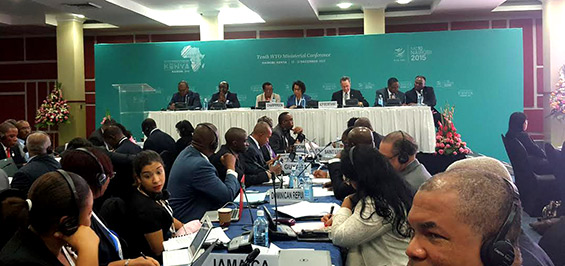ACP Group take on challenging terrain in lead up to WTO negotiations

Nairobi, 14 December 2015/ ACP: Trade Ministers and officials from African, Caribbean and Pacific (ACP) nations gathered for a strategic preparatory meeting today, ahead of the 10th Ministerial Conference (MC10) of the World Trade Organisation in Nairobi, Kenya on 15-18 December.
Chair and spokesperson of the ACP Group for MC10, Hon. Maxine McClean, Minister of Foreign Affairs & Foreign Trade of Barbados opened the session, highlighting a number of unresolved issues which would need to be addressed within the coming days, including agriculture, flexibility issues, special and differential treatment in trade,and the continuation of the Doha Development Agenda.
ACP Secretary General Dr. Patrick Gomes, Coordinator of the ACP Group in Geneva Amb. Marion Williams, and a representative of Kenyan Cabinet Secretary for Foreign Affairs and International Trade Amb. Amina Mohamed also delivered introductory statements.
Secretary General of the United Nations Centre for Trade and Development (UNCTAD) Mr. Mukhisa Kituyi made a presentation on the context in which the ACP countries had to negotiate, highlighting several key challenges to monitor closely.
Firstly, the global decline of trade growth has seen the global GDP grow faster than trade since the financial crisis in 2008. If the trend continues, by 2020 global trade growth would be much slower than any time in history since the Second World War. The rise of the mega-plurilateral agreements such as the Trans-Atlantic and Trans-Pacific schemes may also threaten the gains made by developing countries under the multilateral trading system (MTS), such as those on market access. Despite the slow progress of the multilateral process, ACP countries are concerned that concluding an outcome should not be forced at the expense of a balanced deal.
Finally, while higher cost of labour in the industrialised countries creates new markets for others, this model could be affected by the exponential growth of artificial intelligence and robotics in the industrial North, gradually taking over many labour-intensive jobs.
Mr. Kituyi added that the global development agenda towards 2030 was also a key element to consider. With the unfinished business of the Millennium Development Goals (MDGs) still to be resolved, a central question is how to deal with raised ambitions with reduced resource additionality following various crises around the world affecting development finance.
Declaration
During the meeting, WTO members of the ACP Group reaffirmed their declaration on the WTO 10th Ministerial Conference, which was previously endorsed in October by trade ministers meeting in Brussels.
ACP countries took the floor to emphasise their commitment to the Doha Development Agenda (DDA), and their determination not to let the DDA "be buried in Nairobi", calling instead for the conclusion of remaining issues in a balanced way.
Amongst the 15 development decisions proposed in the ACP declaration include ministerial affirmation on: flexibilities for Least Developed Countries (LDCs) and Small and Vulnerable Economies (SVEs) in agriculture and non-agriculture goods; agreed flexibilities for developing countries in service negotiations; and different tariff reduction targets to be defined for developed countries, developing countries, and SVEs in accordance with the principles of special differentiated treatment and less than full reciprocity. LDCs shall be exempt from making tariff reductions.
The declaration also called for concrete and binding decisions on cotton, as well as in the areas put forward by LDCs, and specific proposals submitted by the G90 countries.
Fisheries remains an important issue, and the Group was seeking convergence during today's meeting on how to move forward on it.
(Photo: Preparatory meeting of ACP Trade Ministers before the 10th Ministerial Conference of the WTO in Nairobi, Kenya.)
– ACP Press
